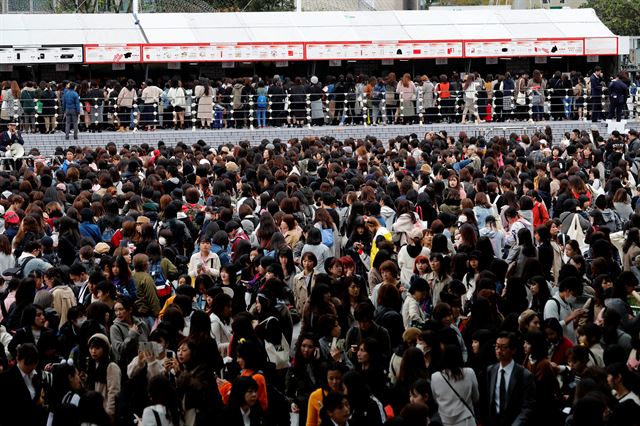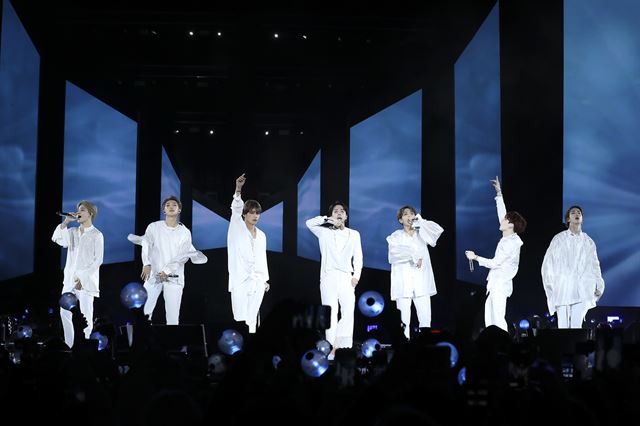


Japan's far-right forces have pushed it to an anti-Japanese group, but it was not enough to prevent the popularity of BTS.
Tokyo Dome, located in Bunkyo District, Japan Tokyo Island () on the afternoon of the 13th. Although it was about two hours before the performance, the performance hall of BTS, where Japan TV's music broadcast was canceled due to the controversy over Atomic Bight T-shirt, was crowded with tens of thousands of Japan fans. A long procession continued around the booth, which sells BTS commemorative products (Goods) installed around the venue, from early morning, and some products sold out in the afternoon as fans who failed to get a performance ticket joined the ranks of purchasing souvenirs.
Some fans wore name tags with members' names in Korean, and those wearing T-shirts with the name Jimin in Korean were also noticeable. A photo of mushroom clouds caused by the atomic bomb drop appeared to be a cheer for Jimin, who became the target of the far right by wearing a printed T-shirt. “I don’t care much about the station canceling the show late with a photo from a year ago,” said a woman in her 20s who said she was from Osaka University to watch the show. “We just like and support BTS music,” said the teenage fans who took commemorative photos with the official BTS light stick (Ya Kwang-bong) they bought, “but the Korean-Japanese media are giving political meaning to highlight the conflict.” Some fans who met at the scene were cautious about asking about the controversy over BTS in both countries recently.
Recently, Japan right wing and some media's BTS hit have been raised, raising concerns that there will be a protest around the venue. In the vicinity of Suidobashi Station, hundreds of meters away from the actual performance hall, Japan right wing made a hateful statement with a one-person relay demonstration, but passers-by did not pay much attention and showed rather annoying responses. Rather, against the protest against the hate, citizens with pickets with Japanese words, which means Korean-Japanese friendship, were also noticed.
The Tokyo Dome, performed by BTS, is a large venue that can accommodate more than 45,000 people, and the concert was completed with a full audience at a place called "Dream Stage" by Japanese singers. Jimin, a BTS member who was wearing a bomb T-shirt, said he was sorry to the Japanese audience after finishing the final stage. BTS agency Big Hit Entertainment also said, "I sincerely apologize for the inconvenience caused by the atomic bomb image." The Tokyo Dome performance ticket, which will last until the 14th, is all out. BTS will perform at the Tokyo Dome, 21, 23, 24 Days Osaka University Kyocera Dome, Nagoya Dome on January 12 and 13 next year, and Fukuoka on February 16 and 17, and will mobilize a total of 380,000 viewers.
There was also concern that the controversy could shrink the position of BTS in Japan, but the music market still continued to win. On Japan's record sales aggregation site Oricon chart, BTS reached the top of the single chart during the week (5-11) with the single Fake Love/Airplane Part 2, released by Japan on the 7th.
BTS also became the first overseas singer to exceed 400,000 points in its first week of release, meaning that BTS's single album sales were so explosive. Oricon charts ranked the album sales by scoring, with BTS scoring 454,829 points. It is a proof that BTS, which is leading the Korean Wave in Japan, is continuing its popularity as it solidifies the foundation of K-pop even in some hateful atmosphere.
Although Japan's anti-Japanese movement has been detected since the Supreme Court's ruling on the compensation for forced labor in Japan, it is evaluated that it has not surpassed the popularity of K-pop groups such as BTS and TWICE. TWICE was ranked # 1 on the Oricon weekly album chart on the 5th with the album Yes O'REYES released on the 5th. Furthermore, TWICE topped the list with Korean albums, not Japanese albums; it is the first time TWICE has topped the Oricon weekly charts with Korean albums.
After former President Lee Myung - bak 's visit to Dokdo in 2012, K - pop' s popularity shrank in Japan 's terrestrial broadcasting. However, the fact that K-pop singers have not been affected by the recent anti-Japanese controversy proves the power of the third Korean Wave boom. Especially, it is different from the previous one that teenage women, the main consumer of K-pop, are exposed to music through YouTube and social network services (SNS) rather than TV where political influence can work. “The fact that BTS and TWICE are making progress in the cold political relationship between Korea and Japan means that the K-pop consumer group is holding up as much as that in the local area,” said Kim Sang-hwa, a music critic.
Tokyo: Correspondent Kim Hoe-kyung
'Friendly' protests against 'disgusting' protests .. Beyond political offensive, BTS and TWICE Oricon top spot